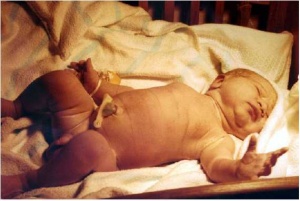2010 Foundations Practical - Introduction to Human Development: Difference between revisions
m (Redirected page to Foundations Practical - Introduction to Human Development) |
|||
| (6 intermediate revisions by 2 users not shown) | |||
| Line 1: | Line 1: | ||
#REDIRECT [[Foundations_Practical_-_Introduction_to_Human_Development]] | |||
==Introduction== | ==Introduction== | ||
[[File:Foundsmall.jpg|left]]Human development is one of the most exciting topics to study not only as a medical student, but also for our fundamental understanding of the human body. It is important at this stage of your studies to have a broad understanding of the timing of events in human development, so that you can understand normal development, organ development and when things go wrong (abnormal development). Many of the concepts introduced broadly today will be covered in detail in Beginnings, Growth and Development (BGD). | [[File:Foundsmall.jpg|left]]Human development is one of the most exciting topics to study not only as a medical student, but also for our fundamental understanding of the human body. It is important at this stage of your studies to have a broad understanding of the timing of events in human development, so that you can understand normal development, organ development and when things go wrong (abnormal development). Many of the concepts introduced broadly today will be covered in detail in Beginnings, Growth and Development (BGD). | ||
<center>Note this is an archive copy of 2010 practical, many links and features may not work. Use the link below to see the current lecture version.</center> | |||
<center>'''Current 2014 Foundations''' [[Foundations_Practical_-_Introduction_to_Human_Development|Practical''']] | [[Foundations_Lecture_-_Introduction_to_Human_Development|'''Lecture''']]</center> | |||
[[File:Early_zygote.jpg]] [[File:Newborn.jpg|300px]] | [[File:Early_zygote.jpg]] [[File:Newborn.jpg|300px]] | ||
This is sometimes not an easy topic to study with many very specific terms, dynamic processes and transient structures. For new terms or concepts that you don't understand use the Glossary link or '''search''' window on the left of each page. | This is sometimes not an easy topic to study with many very specific terms, dynamic processes and transient structures. For new terms or concepts that you don't understand use the '''Glossary''' link (at the bottom of each page), '''Terms''' list (at the bottom of some pages) or '''search''' window (on the left of each page). | ||
| Line 20: | Line 25: | ||
[[Foundations_Practical_-_Week_1_and_2|Lets Start........]] | [[Foundations_Practical_-_Week_1_and_2|Lets Start........]] | ||
Latest revision as of 08:50, 18 September 2014
Introduction
Human development is one of the most exciting topics to study not only as a medical student, but also for our fundamental understanding of the human body. It is important at this stage of your studies to have a broad understanding of the timing of events in human development, so that you can understand normal development, organ development and when things go wrong (abnormal development). Many of the concepts introduced broadly today will be covered in detail in Beginnings, Growth and Development (BGD).
This is sometimes not an easy topic to study with many very specific terms, dynamic processes and transient structures. For new terms or concepts that you don't understand use the Glossary link (at the bottom of each page), Terms list (at the bottom of some pages) or search window (on the left of each page).
Keep coming back to embryology (and this site) as you progress through your studies and it will eventually make more sense!
Objectives
- General understanding of the early events of human development.
- Understand the key divisions, events and timecourse of human development.
- Understand the concept of mixed embryonic origins of different tissues and organs.
- General understanding of the term “critical periods” of development.


